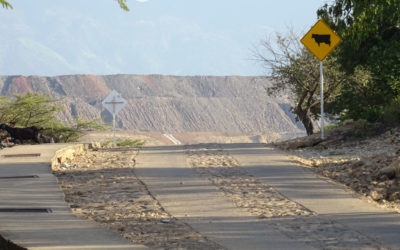Press release:
Government entities and Carbones del Cerrejón disregard the orders and guidelines of the Constitutional Court for the exploitation and diversion of the Bruno, the last great tributary of the Ranchería River in La Guajira
On June 5th and 6th 2019, the Interinstitutional Roundtable for the Arroyo Bruno convened within the framework of the SU-698 Sentence of 2017. In this sentence, the Constitutional Court safeguards the fundamental rights to water, food security and health of more than 30 Wayuu communities in la Guajira, which are under threat due to the diversion of the Arroyo Bruno by the company Carbones del Cerrejón. To modify this important tributary, the most abundant stream that feeds the Ranchería River, an artificial riverbed 3.6 kilometers long was constructed, and the original waterway blocked. The Constitutional Court suspended the construction due to grave uncertainties in the license with respect to the environmental, social and cultural impacts of the project. This sentence then ordered that these uncertainties be resolved by the Interinstitutional Roundtable in order to determine the social and environmental viability of the project.
The Interinstitutional Roundtable, created by the Tribunal of Riohacha in May of 2016 and legally confirmed by the Council of the State, was intended to protect the rights of the claimant communities and attend to the uncertainties presented by the Constitutional Court. However, to this day, our right to participate in the roundtable has been repeatedly ignored on various occasions, even though, in line with the Court’s ruling, the impacted communities and the associated parties that have participated in the process have repeatedly insisted on effective involvement in the debates and decision making of the roundtable. Yet the response has been to deny access to the information, acts and relevant documents from prior closed-door meetings of the past 2 years between the different state entities. Additionally, we were informed of the time and place of the meeting by email with only 10 days’ notice, without receiving any information and without being consulted about the date and time.
We attended the roundtable meeting, because we recognize the importance of what is being decided in this space. We publicly and formally expressed our disagreement with the proposed agenda and with the imposed dynamics of the meeting, and we requested a participatory establishment of the agenda and methodology for the meetings moving forward. We also publicly demanded access to the decisions that the roundtable had already made behind closed doors and insisted on guarantees for the attendance and participation of the independent experts that are an integral part of the debate. We demanded, in accordance with the sentence, to participate in the decision around the reestablishment of the Bruno to its natural channel (EIGHTH ORDEN of the Sentence SU 698/17). The independent experts and professionals involved in the judicial process couldn’t attend given the absence of guarantees of participation. Without a doubt, it was evident that the intention of the institutions involved was to deny our participation as active and integral members of the interinstitutional roundtable, contrary to what the sentence dictates.
During the session on June 5th, Wayuu and Afrocolombian communities of Paradero, La Gran Parada, La Horqueta, Cuatro de Noviembre, Coveñas, Los Remedios, Charito, Tabaco, Arroyo Bruno y La Esperanza, El Rocío, Kamenachan, Piturumana, Itaka, together with the participating organizations CCAJAR,
Cinep/PPP and Censat- Agua Viva, informed the company and the participating entities of the roundtable of our proposal for the timetable, methodology, and “established rules.” We insisted that the departure point be to discuss the EIGHTH ORDER of the sentence…
Signed: Communities of La Gran Parada, Paradero and La Horqueta CCAJAR Colectivo de Abogados José Alvear Restrepo CINEP/PPP Centro de Investigación y Educación Popular/Programa por la Paz Censat-Agua Viva
Read full press release:07.06.19. Statement from CINEP and CCAJAR – Arroyo Bruno



